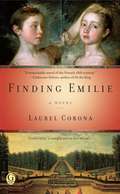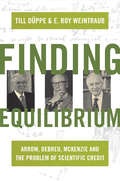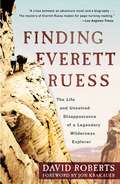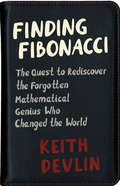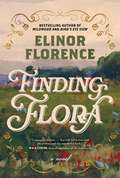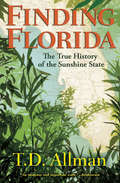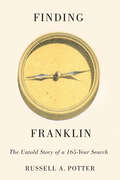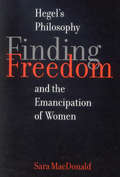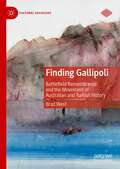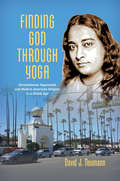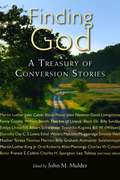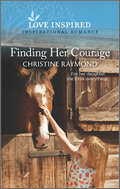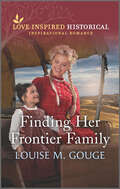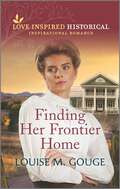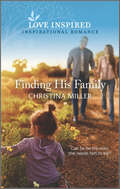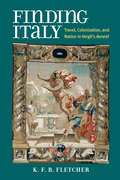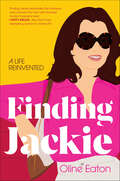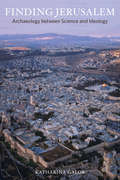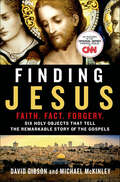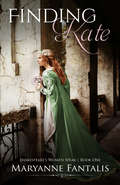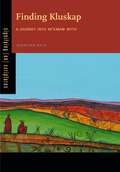- Table View
- List View
Finding Emilie
by Laurel CoronaWoman is born free, and everywhere she is in corsets. . . . Lili du Châtelet yearns to know more about her mother, the brilliant French mathematician Emilie. But the shrouded details of Emilie's unconventional life--and her sudden death--are elusive. Caught between the confines of a convent upbringing and the intrigues of the Versailles court, Lili blossoms under the care of a Parisian salonnière as she absorbs the excitement of the Enlightenment, even as the scandalous shadow of her mother's past haunts her and puts her on her own path of self-discovery. Laurel Corona's breathtaking new novel, set on the eve of the French Revolution, vividly illuminates the tensions of the times, and the dangerous dance between the need to conform and the desire to chart one's own destiny and journey of the heart.
Finding Equilibrium: Arrow, Debreu, McKenzie and the Problem of Scientific Credit
by E. Roy Weintraub Till DüppeThe remarkable story and personalities behind one of the most important theories in modern economicsFinding Equilibrium explores the post–World War II transformation of economics by constructing a history of the proof of its central dogma—that a competitive market economy may possess a set of equilibrium prices. The model economy for which the theorem could be proved was mapped out in 1954 by Kenneth Arrow and Gerard Debreu collaboratively, and by Lionel McKenzie separately, and would become widely known as the "Arrow-Debreu Model." While Arrow and Debreu would later go on to win separate Nobel prizes in economics, McKenzie would never receive it. Till Düppe and E. Roy Weintraub explore the lives and work of these economists and the issues of scientific credit against the extraordinary backdrop of overlapping research communities and an economics discipline that was shifting dramatically to mathematical modes of expression.Based on recently opened archives, Finding Equilibrium shows the complex interplay between each man's personal life and work, and examines compelling ideas about scientific credit, publication, regard for different research institutions, and the awarding of Nobel prizes. Instead of asking whether recognition was rightly or wrongly given, and who were the heroes or villains, the book considers attitudes toward intellectual credit and strategies to gain it vis-à-vis the communities that grant it.Telling the story behind the proof of the central theorem in economics, Finding Equilibrium sheds light on the changing nature of the scientific community and the critical connections between the personal and public rewards of scientific work.
Finding Everett Ruess: The Life and Unsolved Disappearance of a Legendary Wilderness Explorer
by David Roberts Jon KrakauerFinding Everett Ruess by David Roberts, with a foreword by Jon Krakauer, is the definitive biography of the artist, writer, and eloquent celebrator of the wilderness whose bold solo explorations of the American West and mysterious disappearance in the Utah desert at age 20 have earned him a large and devoted cult following. More than 75 years after his vanishing, Ruess stirs the kinds of passion and speculation accorded such legendary doomed American adventurers as Into the Wild's Chris McCandless and Amelia Earhart. "I have not tired of the wilderness; rather I enjoy its beauty and the vagrant life I lead, more keenly all the time. I prefer the saddle to the street car and the star sprinkled sky to a roof, the obscure and difficult trail, leading into the unknown, to any paved highway, and the deep peace of the wild to the discontent bred by cities." So Everett Ruess wrote in his last letter to his brother. And earlier, in a valedictory poem, "Say that I starved; that I was lost and weary; That I was burned and blinded by the desert sun; Footsore, thirsty, sick with strange diseases; Lonely and wet and cold . . . but that I kept my dream!" Wandering alone with burros and pack horses through California and the Southwest for five years in the early 1930s, on voyages lasting as long as ten months, Ruess also became friends with photographers Edward Weston and Dorothea Lange, swapped prints with Ansel Adams, took part in a Hopi ceremony, learned to speak Navajo, and was among the first "outsiders" to venture deeply into what was then (and to some extent still is) largely a little-known wilderness. When he vanished without a trace in November 1934, Ruess left behind thousands of pages of journals, letters, and poems, as well as more than a hundred watercolor paintings and blockprint engravings. A Ruess mystique, initiated by his parents but soon enlarged by readers and critics who, struck by his remarkable connection to the wild, likened him to a fledgling John Muir. Today, the Ruess cult has more adherents--and more passionate ones--than at any time in the seven-plus decades since his disappearance. By now, Everett Ruess is hailed as a paragon of solo exploration, while the mystery of his death remains one of the greatest riddles in the annals of American adventure. David Roberts began probing the life and death of Everett Ruess for National Geographic Adventure magazine in 1998. Finding Everett Ruess is the result of his personal journeys into the remote areas explored by Ruess, his interviews with oldtimers who encountered the young vagabond and with Ruess's closest living relatives, and his deep immersion in Ruess's writings and artwork. It is an epic narrative of a driven and acutely perceptive young adventurer's expeditions into the wildernesses of landscape and self-discovery, as well as an absorbing investigation of the continuing mystery of his disappearance. In this definitive account of Ruess's extraordinary life and the enigma of his vanishing, David Roberts eloquently captures Ruess's tragic genius and ongoing fascination.From the Hardcover edition.
Finding Fibonacci: The Quest to Rediscover the Forgotten Mathematical Genius Who Changed the World
by Keith DevlinIn 2000, Keith Devlin set out to research the life and legacy of the medieval mathematician Leonardo of Pisa, popularly known as Fibonacci, whose book Liber abbaci has quite literally affected the lives of everyone alive today. Although he is most famous for the Fibonacci numbers—which, it so happens, he didn't invent—Fibonacci's greatest contribution was as an expositor of mathematical ideas at a level ordinary people could understand. In 1202, Liber abbaci—the "Book of Calculation"—introduced modern arithmetic to the Western world. Yet Fibonacci was long forgotten after his death, and it was not until the 1960s that his true achievements were finally recognized.Finding Fibonacci is Devlin's compelling firsthand account of his ten-year quest to tell Fibonacci's story. Devlin, a math expositor himself, kept a diary of the undertaking, which he draws on here to describe the project's highs and lows, its false starts and disappointments, the tragedies and unexpected turns, some hilarious episodes, and the occasional lucky breaks. You will also meet the unique individuals Devlin encountered along the way, people who, each for their own reasons, became fascinated by Fibonacci, from the Yale professor who traced modern finance back to Fibonacci to the Italian historian who made the crucial archival discovery that brought together all the threads of Fibonacci's astonishing story.Fibonacci helped to revive the West as the cradle of science, technology, and commerce, yet he vanished from the pages of history. This is Devlin's search to find him.
Finding Flora
by Elinor FlorenceInstant #1 Bestseller A rollicking historical novel set in turn-of-the-century Alberta about a young woman on the run from her abusive husband who uses a legal loophole to claim a homestead in the Wild West—perfect for fans of Outlawed and The Giver of Stars.Scottish newcomer Flora Craigie jumps from a moving train in 1905 to escape her abusive husband. Desperate to disappear, she claims a homestead on the beautiful but wild Alberta prairie, determined to create a new life for herself. She is astonished to find that her nearest neighbours are also female: a Welsh widow with three children; two American women raising chickens; and a Métis woman who supports herself by training wild horses. While battling both the brutal environment and the local cynicism toward female farmers, the five women with their very different backgrounds struggle to find common ground. But when their homes are threatened with expropriation by a hostile government, they join forces to &“fire the heather,&” a Scottish term meaning to raise a ruckus. To complicate matters, there are signs that Flora&’s violent husband is still hunting for her. And as the competition for free land along the new Canadian Pacific Railway line heats up, an unscrupulous land agent threatens not only Flora&’s livelihood, but her very existence.
Finding Florida: The True History of the Sunshine State
by T. D. AllmanLonglisted for the National Book Award and a Kirkus Reviews Best Nonfiction Book of the YearOver the centuries, Florida has been many things: an unconquered realm protected by geography, a wilderness that ruined Spanish conquistadors, "god’s waiting room,” and a place to start over. Depopulated after the extermination of its original native population, today it’s home to nineteen million. The site of vicious racial violence, including massacres, slavery, and the roll-back of Reconstruction, Florida is now one of our most diverse states, a dynamic multicultural place with an essential role in 21st-century America.In Finding Florida, journalist T.D. Allman reclaims the remarkable history of Florida from the state’s mythologizers, apologists, and boosters. Allman traces the discovery, exploration, and settlement of Florida, its transformation from a swamp to "paradise.” Palm Beach, Key West, Miami, Tampa, and Orlando boomed, fortunes were won and lost, land was stolen and flipped, and millions arrived. The product of a decade of research and writing, Finding Florida is a highly original, stylish, and masterful work, the first modern comprehensive history of this fascinating place.
Finding Franklin: The Untold Story of a 165-Year Search
by Russell A. PotterIn 2014 media around the world buzzed with news that an archaeological team from Parks Canada had located and identified the wreck of HMS Erebus, the flagship of Sir John Franklin’s lost expedition to find the Northwest Passage. Finding Franklin outlines the larger story and the cast of detectives from every walk of life that led to the discovery, solving one of the Arctic’s greatest mysteries. In compelling and accessible prose, Russell Potter details his decades of work alongside key figures in the era of modern searches for the expedition and elucidates how shared research and ideas have led to a fuller understanding of the Franklin crew’s final months. Illustrated with numerous images and maps from the last two centuries, Finding Franklin recounts the more than fifty searches for traces of his ships and crew, and the dedicated, often obsessive, men and women who embarked on them. Potter discusses the crucial role that Inuit oral accounts, often cited but rarely understood, played in all of these searches, and continue to play to this day, and offers historical and cultural context to the contemporary debates over the significance of Franklin’s achievement. While examination of HMS Erebus will undoubtedly reveal further details of this mystery, Finding Franklin assembles the stories behind the myth and illuminates what is ultimately a remarkable decades-long discovery.
Finding Franklin: The Untold Story of a 165-Year Search
by Russell PotterIn 2014 media around the world buzzed with news that an archaeological team from Parks Canada had located and identified the wreck of HMS Erebus, the flagship of Sir John Franklin’s lost expedition to find the Northwest Passage. Finding Franklin outlines the larger story and the cast of detectives from every walk of life that led to the discovery, solving one of the Arctic’s greatest mysteries. In compelling prose, Russell Potter details his decades of work alongside key figures in the era of modern searches and elucidates how shared research and ideas have led to a fuller understanding of the Franklin crew’s final months. Illustrated with images and maps from the last two centuries, Finding Franklin recounts the more than fifty searches for traces of his ships and crew, and the dedicated, often obsessive, men and women who embarked on them. Potter discusses the crucial role that Inuit oral accounts, often cited but rarely understood, played in all of these searches, and continue to play to this day, and offers historical and cultural context to the contemporary debates over the significance of Franklin’s achievement. While examination of HMS Erebus will undoubtedly reveal further details of this mystery, Finding Franklin assembles the stories behind the myth and illuminates what is ultimately a remarkable decades-long discovery.
Finding Freedom
by Sara MacdonaldCombining a detailed study of Hegel's political philosophy with close readings of two important literary works that help clarify his thought, MacDonald traces the historical development of an enduring link between personal lives and stable political communities. While Sophocles' Antigone highlights the tension in states that deny the interests of their citizens, MacDonald shows that Shakespeare's A Midsummer Night's Dream offers an alternative image, one that sees freedom for all as essential to an ethical family and state and is consistent with Hegel's thought in both the Phenomenology of Spirit and The Philosophy of Right.
Finding Freedom: Hegel's Philosophy and the Emancipation of Women (McGill-Queen's Studies in the History of Ideas #45)
by Sara MacDonaldCombining a detailed study of Hegel's political philosophy with close readings of two important literary works that help clarify his thought, MacDonald traces the historical development of an enduring link between personal lives and stable political communities. While Sophocles' Antigone highlights the tension in states that deny the interests of their citizens, MacDonald shows that Shakespeare's A Midsummer Night's Dream offers an alternative image, one that sees freedom for all as essential to an ethical family and state and is consistent with Hegel's thought in both the Phenomenology of Spirit and The Philosophy of Right.
Finding Gallipoli: Battlefield Remembrance and the Movement of Australian and Turkish History (Cultural Sociology)
by Brad WestThis book is about how Australian and Turkish historical understanding of the First World War Gallipoli Campaign has been shaped by travel to the battlefield for the purposes of commemoration. Utilizing a cultural historical method, the study begins with examining how cultural conceptions of travel influenced the experience of those fighting in the 1915 Battle, and ends with the way that new global insecurities and the withdrawal of Western troops from Afghanistan in 2021 is reflecting and influencing Australia and Turkey’s social memory of their military past. This wide historical lens and the author’s original fieldwork and analysis of documents allows for an in-depth exploration of the ways in which cultural patterns of social memory develop over time and mapping of how specific cultural representations in the past are reclaimed. The book argues that travel is a key factor influencing social change by providing distinctive ritual experiences that afford unique, discursive opportunities and empowering particular carriers and custodians of social memory.
Finding God through Yoga: Paramahansa Yogananda and Modern American Religion in a Global Age
by David J. NeumannParamahansa Yogananda (1893–1952), a Hindu missionary to the United States, wrote one of the world's most highly acclaimed spiritual classics, Autobiography of a Yogi, which was first published in 1946 and continues to be one of the best-selling spiritual philosophy titles of all time. In this critical biography, David Neumann tells the story of Yogananda's fascinating life while interpreting his position in religious history, transnational modernity, and American culture. Beginning with Yogananda's spiritual investigations in his native India, Neumann tells how this early "global guru" emigrated to the United States in 1920 and established his headquarters, the Self-Realization Fellowship, in Los Angeles, where it continues today. Preaching his message of Hindu yogic philosophy in a land that routinely sent its own evangelists to India, Yogananda was fueled by a religious nationalism that led him to conclude that Hinduism could uniquely fill a spiritual void in America and Europe. At the same time, he embraced a growing belief that Hinduism's success outside South Asia hinged on a sincere understanding of Christian belief and practice. By "universalizing" Hinduism, Neumann argues, Yogananda helped create the novel vocation of Hindu yogi evangelist, generating fresh connections between religion and commercial culture in a deepening American religious pluralism.
Finding God: A Treasury of Conversion Stories
by John M. MulderThe search for God is a staple of human history. Finding God records sixty first-person accounts of Christians who found God in different ways and the impact this discovery made on their lives and on the world in which they lived. Ranging from the first century to the present, Finding God is a fascinating digest of conversion stories from a wide variety of people -- from the apostle Paul to the rock musician Bono. These narratives together demonstrate the remarkable diversity of spiritual journeys and the dramatic changes that can result from encounters with God. Both instructive and inspirational, Finding God will expand horizons and deepen the faith of those who seek insight into the age-old spiritual quest to find God.
Finding Her Amish Home: An Uplifting Inspirational Romance
by Pamela Desmond WrightA woman starts over in an Amish community to make a new life for the child in her care and finds love with a local man in this inspirational romance.After her twin sister’s death, Maddie Baum flees to Wisconsin Amish country with her nephew in tow in the hopes of protecting him from his criminal father. Befriending Amish shopkeeper Abram Mueller gives her a glimpse of the happiness she’s been yearning for all along. Can she find a fresh start with Abram—or will old sins tear them apart?
Finding Her Courage
by Christine RaymondCan she overcome her fears, to bring peace to her little girl? Camille Bellamy&’s six-year-old daughter hasn&’t spoken since her father died in a plane crash. To provide for Evie, Camille has to convince Ty Spencer to sell the ranch they both inherited, but she fears spending time with the pilot could be a painful reminder. Yet surprisingly, her little girl forms a bond with Ty, forcing Camille to face her own fear—risking her heart again.From Love Inspired: Uplifting stories of faith, forgiveness and hope.
Finding Her Frontier Family
by Louise M. GougeHelping a little girl could give her the family she needs Tasked with escorting her late cousin&’s daughter to New Mexico Territory, spinster Viola Brinson intends to bring Lavinia to her father&’s ranch and immediately return to the city. But after one look at the living conditions, she&’s hesitant to leave the little girl with Robert Mattson. When Viola settles in to clean the place and make sure he can safely care for his daughter, Robert is determined to keep his distance. His heart was broken by a society woman once before—and he won&’t make the same mistake twice. But Viola surprises him at every turn. Might she be exactly what his family needs?
Finding Her Frontier Home
by Louise M. GougeA ranch out Westcould be the home she&’s longed for. Lila Rose Duval has a safe, protected life in Charleston as a lady&’s companion for Rebecca Mattson—until the woman&’s handsome but disheveled son Drew arrives at her door. Now they&’re all traveling to the breathtaking wildness of New Mexico Territory to reunite the entire Mattson clan. But the refined, genteel Lila Rose knows nothing of ranching life beyond etiquette and burning food. Worse still, Drew might just be falling for her. But can love convince this city girl that she belongs in the wild beauty of the West…with him?
Finding Her Way
by Marta PerryTrusting in second chancesFinding Her Way by Marta Perry When Caitlyn Villard becomes mother to her orphaned twin five-year-old nieces, she trades New York City for Prairie Springs, Texas, the small military town she&’d run from at first chance. Learning how to be a slow-paced soccer mom is not easy. Until handsome army chaplain Steve Windham steps in to show Caitlyn that sometimes you find the man—and life—of your dreams where you least expected. FREE BONUS STORY INCLUDED IN THIS VOLUME!The Bull Rider's Secret by Jill Lynn Letting bull rider Jace Hawke back into her life breaks all of Mackenzie Wilder&’s rules—just like he broke her heart years ago. Jace is working at her family&’s ranch while recovering from a rodeo injury…and chipping away at Mackenzie&’s tough-girl exterior with each passing day. Which is the bigger mistake: falling for Jace again…or letting him go without a fight? Previously published as Mission: Motherhood
Finding His Family
by Christina MillerCan he be the man she needs him to be? Now that he’s found them,he can’t let them go.The last person Abe Armstrong thought would walk through the door of his gym is Rosemary Williams, the woman he secretly married as a teen. Even more surprising is the little girl at her side—his daughter. It’s been four years since Abe and Rosemary broke each other’s hearts…and he hopes this time will be different. But first Abe must prove he’s father and husband material.From Love Inspired: Uplifting stories of faith, forgiveness and hope.
Finding Italy: Travel, Nation, and Colonization in Vergil's Aeneid
by Kristopher FletcherFinding Italy explores the journey of the Romans' ancestor Aeneas and his fellow Trojans from their old home, Troy, to their new country, Italy, narrated in Vergil's epic poem Aeneid. K. F. B. Fletcher argues that a main narrative theme is patriotism, specifically the problem of how one comes to love one's new country. The various directions Aeneas receives throughout the first half of the poem are meant to create this love, explaining both to Aeneas and to Vergil's readers how they should respond to the new, unified Italy synonymous with Rome. These directions come from the gods, or from people close to Aeneas who have divine connections, and they all serve to instill an emotional connection to the land, creating a mental image of Italy that tells him far more about his destination than merely its location, and ultimately making him fall in love with Italy enough to fight for it soon after his arrival. The poem thus dramatizes the birth of nationalism, as Italy is only a concept to Aeneas throughout his trip; these directions do not describe Italy as it is at the time of Aeneas' journey, but as an ideal to be realized by Aeneas and his descendants, reaching its final, perfect form under Augustus Caesar. Finding Italy provides a very detailed reading of the directions Aeneas receives by situating them within their relevant contexts: ancient geography, Greek colonization narratives, prophecy, and ancient views of wandering. Vergil draws on all of these concepts to craft instructions that create in Aeneas an attachment to Italy before he ever arrives, a process that dramatizes a key emotional problem in the late first century BCE in the wake of the Social and Civil Wars: how to balance the love of one's modest birthplace with the love of Rome, the larger city that now encompasses it.
Finding Jackie: A Life Reinvented
by Oline Eaton“Penetrates the mystique and unravels the myth with the best Jackie biography ever.”—Kitty Kelley, New York Times bestselling author of Jackie Oh! and Oprah: A Biography A brilliant biography of Jacqueline Kennedy Onassis, casting an era’s biggest “star of life” in a new light for a new generation In Finding Jackie, Oline Eaton resurrects the Jackie Kennedy Onassis who has been culturally erased, who we need now more than ever—not the First Lady who was a paragon of femininity, fashion, American wifeliness and motherhood, but rather the kaleidoscopic Jackie who emerged after the murder of her husband changed her world and ours. Here is the story of Jackie’s reinvention into an adventurer, a wanderer, a woman and an idea in whom many Americans and people around the globe have deeply, fiercely wanted to believe. Traumatized and exposed, Jacqueline Bouvier Kennedy nonetheless built a new life for herself in an America similarly haunted by upheaval. She dated and traveled relentlessly before scandalizing the world by marrying a foreigner, living abroad, climbing ruins, cruising the oceans, and wandering Europe braless and barefoot. She was an era’s most celebrated, exposed, beloved, reviled, written about, and followed “star of life.” Jackie’s story—treated like a national soap opera and transmitted through newspapers, magazines, images, and TV during the 1960s and 1970s—became wired into America’s emotional grid. Touching down everywhere from London, Paris, the Watergate, and 1040 Fifth Avenue to Skorpios, Athens, Capri, and Phnom Penh, Finding Jackie returns Jackie’s narrative to its original context of a serialized drama unfurling alongside the Civil Rights movement, women’s liberation, and the Vietnam War.
Finding Jerusalem: Archaeology between Science and Ideology
by Katharina GalorA free ebook version of this title is available through Luminos, University of California Press’s open access publishing program. Visit www.luminosoa.org to learn more. Archaeological discoveries in Jerusalem capture worldwide attention in various media outlets. The continuing quest to discover the city’s physical remains is not simply an attempt to define Israel’s past or determine its historical legacy. In the context of the ongoing Israeli-Palestinian conflict, it is also an attempt to legitimate—or undercut—national claims to sovereignty. Bridging the ever-widening gap between popular coverage and specialized literature, Finding Jerusalem provides a comprehensive tour of the politics of archaeology in the city. Through a wide-ranging discussion of the material evidence, Katharina Galor illuminates the complex legal contexts and ethical precepts that underlie archaeological activity and the discourse of "cultural heritage" in Jerusalem. This book addresses the pressing need to disentangle historical documentation from the religious aspirations, social ambitions, and political commitments that shape its interpretation.
Finding Jesus: Six Holy Objects that Tell the Remarkable Story of the Gospels
by David Gibson Michael McKinleyAs featured in the 6-part CNN SERIES "Finding Jesus"FINDING JESUS explores six major artifacts, including the Shroud of Turin, the True Cross, and John the Baptist, that give us the most direct evidence about the life and world of Jesus. The book and attendant CNN series provide a dramatic way to retell "the greatest story ever told" while introducing a broad audience to the history, the latest controversies, and newest forensic science involved in sorting out facts from the fiction of would-be forgers and deceivers. The book and the show draw on experts from all over the world. Beyond the faithful, the book will also appeal to the skeptical and to curious readers of history and archaeology, while it takes viewers of the primetime TV series deeper into the story.
Finding Kate (Shakespeare's Women Speak #1)
by Maryanne FantalisNot even a generous dowry can tempt any man to court Kathryn, until Sir William rides into town… A &“smart and subtle&” retelling of The Taming of the Shrew (Katherine Longshore, author of Courted).Kathryn&’s strong will and sharp tongue have branded her a shrew in her small town. And even the temptation of her father&’s wealth cannot sway the men in her direction.Astride his warhorse, William is the pinnacle of manhood and a burr in Kathryn&’s side. His impish &“Kate&” calls raise her hackles, yet she can&’t keep from being lulled by his voice.Though he claims he is the only man for her, she is certain he desires only her rich dowry. When he proposes marriage, she accepts as a way out of her miserable home, but expects nothing. Freed from her cruel family and judgmental town, Kathryn must decide if she will continue her battle of wills with the sometimes charming, often maddening Sir William. Does she remain the shrewish Kathryn—or find a way to be Will&’s Kate? This delightful take on the classic romantic comedy—from the shrew&’s point of view—is &“rich in Shakespearean references and vivid historical details&” (Katherine Longshore).
Finding Kluskap: A Journey into Mi'kmaw Myth (Signifying (on) Scriptures #2)
by Jennifer ReidThe Mi’kmaq of eastern Canada were among the first indigenous North Americans to encounter colonial Europeans. As early as the mid-sixteenth century, they were trading with French fishers, and by the mid-seventeenth century, large numbers of Mi’kmaq had converted to Catholicism. Mi’kmaw Catholicism is perhaps best exemplified by the community’s regard for the figure of Saint Anne, the grandmother of Jesus. Every year for a week, coinciding with the saint’s feast day of July 26, Mi’kmaw peoples from communities throughout Quebec and eastern Canada gather on the small island of Potlotek, off the coast of Nova Scotia. It is, however, far from a conventional Catholic celebration. In fact, it expresses a complex relationship between the Mi’kmaq, Saint Anne, a series of eighteenth-century treaties, and a cultural hero named Kluskap. Finding Kluskap brings together years of historical research and learning among Mi’kmaw peoples on Cape Breton Island, Nova Scotia. The author’s long-term relationship with Mi’kmaw friends and colleagues provides a unique vantage point for scholarship, one shaped not only by personal relationships but also by the cultural, intellectual, and historical situations that inform postcolonial peoples. The picture that emerges when Saint Anne, Kluskap, and the mission are considered in concert with one another is one of the sacred life as a site of adjudication for both the meaning and efficacy of religion—and the impact of modern history on contemporary indigenous religion.
